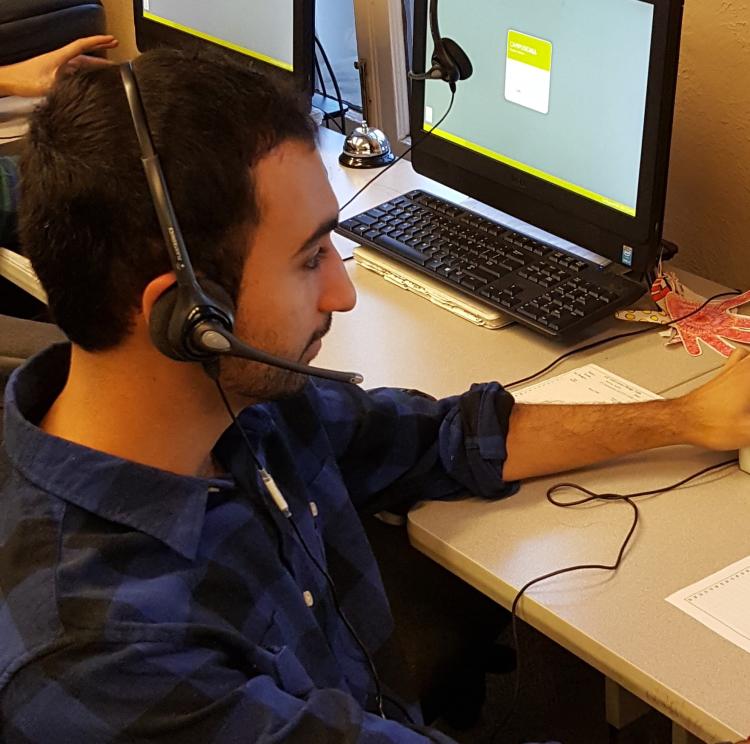There’s a Buff-to-Buff call on line 1
Student call center helps alumni connect with CU Boulder campus
It’s evening. You’re home after a long day at work or taking care of family when the phone rings. You don’t recognize the number, but decide to pick up anyway.
The voice on the other end of the line is pitching something, perhaps asking for a donation. But you know the perfunctory tone of someone going through the motions, and the call doesn’t last long.
It’s incredibly interesting to see what alumni are up to. I always like to hear about their time at CU and how they used what they studied in their careers.”
Another evening. The phone rings and when you pick up, you find yourself talking to a bright, enthusiastic student from your alma mater, the University of Colorado Boulder. A conversation ensues, and you find yourself giving the caller advice on his or her career, learning about the latest developments on campus, laughing, and yes, talking about the importance of private donations to CU Boulder’s mission.
That difference, between caring investment and punching the clock, is a key reason that CU Boulder’s Office of Advancement has long hired students to staff its call center instead of relying on outside employees or contractors.

Students take a quick break from working at the call center.
“When I ran the call center, we always talked about how we could hire anyone. But we always wanted to hire students,” says Amy Metz, who worked as a student caller, then went on to manage the call center from 1991 to 1998. “Hearing from a student is just a great way to develop a connection with the alum on the other end.”
The call center, located in the Page Foundation Center at 1305 University Ave., employs some 25 students who work flexible hours and shifts from 5:30 p.m. to 9 p.m., Monday through Friday. Student callers receive training, but ultimately, it’s their own intriguing personalities, backgrounds and experiences that build connections with alumni.

Sina Karimi
Sina Karimi, a junior pre-health molecular, cellular and developmental biology major, had an early morning job as a phlebotomist when he noticed a flier about student-caller jobs on campus. Eager to find something that better fit his schedule, he applied, got an interview and started the job in May.
“It’s a great job. You’re talking to people for a good cause, meeting people of all different backgrounds,” he says.
Karimi grew up in Aurora. Born in the United States, he spent about half his childhood in a rural setting in his parents’ native Iran. His father, an engineer who now works for the U.S. Postal Service, and mother, a specialist in kidney dialysis, fled that country following the 1979 Islamic revolution. Karimi spoke Farsi before learning English at age 3.
Besides work and school, Karimi recently joined the newly formed CU Boulder Race Crew, a club that races custom-built cars. He’s also a tournament chess player, an outdoors enthusiast who enjoys hiking, biking and running half-marathons, and a soccer player.
Karimi says he especially enjoys talking with alumni who haven’t been back to campus in a while and people who work in the health-care field.
“It’s great to talk to people who haven’t been back to campus in a while, engaging them and letting them know about all the new changes,” he says. “Especially when I’m talking to people in my major, or who work in a field I’m going into, I like to ask them what they’ve done, what they’ve enjoyed and even how they have struggled.”
Senior economics major Mateo Gomez has equally rich background and interests. Born in Colombia, his parents also came to the United States to escape unrest in their native countries. His Nicaraguan father, who now owns an international flower wholesaling business in Los Angeles, and Colombian mother, who studied interior design, met in Miami.

Mateo Gomez
“That’s where the majority of Colombians and Nicaraguans escaping political unrest are,” Gomez says.
Both parents became citizens, and Gomez remembers watching his Colombian mother recite the Pledge of Allegiance with hundreds of other new citizens at the Los Angeles Convention Center when he was a small boy.
Outside the classroom, Gomez is a professional road cyclist and enormous fan of the Colombian national football (aka soccer) team. After graduation, he hopes to parlay his experience at the call center into a job in university advancement before eventually studying international-business law.
He started working at the CU Colorado Springs call center, then continued when he transferred to Boulder. In a mock call with a reporter, Gomez peppers the conversation with “awesomes” and turns the conversation to how changes in the media landscape have affected the reporter’s career. Eventually, they are talking about the importance of private funding to the new College of Media, Communication and Information.
“It’s incredibly interesting to see what alumni are up to,” he says. “I always like to hear about their time at CU and how they used what they studied in their careers.”
As telecommunications technology and habits change—fewer land lines, fewer people picking up—reaching alumni gets more complicated, says Metz, who recently left a second stint at the CU advancement office to become a real-estate agent. But as state funding has continued to decline, private donations have become an even more critical part of CU Boulder’s funding base.
Given that, it’s a real advantage to have genuinely skilled, engaged, friendly, even fun, students having conversations with alumni.
“Hearing from students, (alumni) can automatically develop that connection,” Metz says. “And I’ve got to say that making all those calls prepared me for a lot of things I’ve done in life. … It’s really great preparation for a bunch of careers.”

